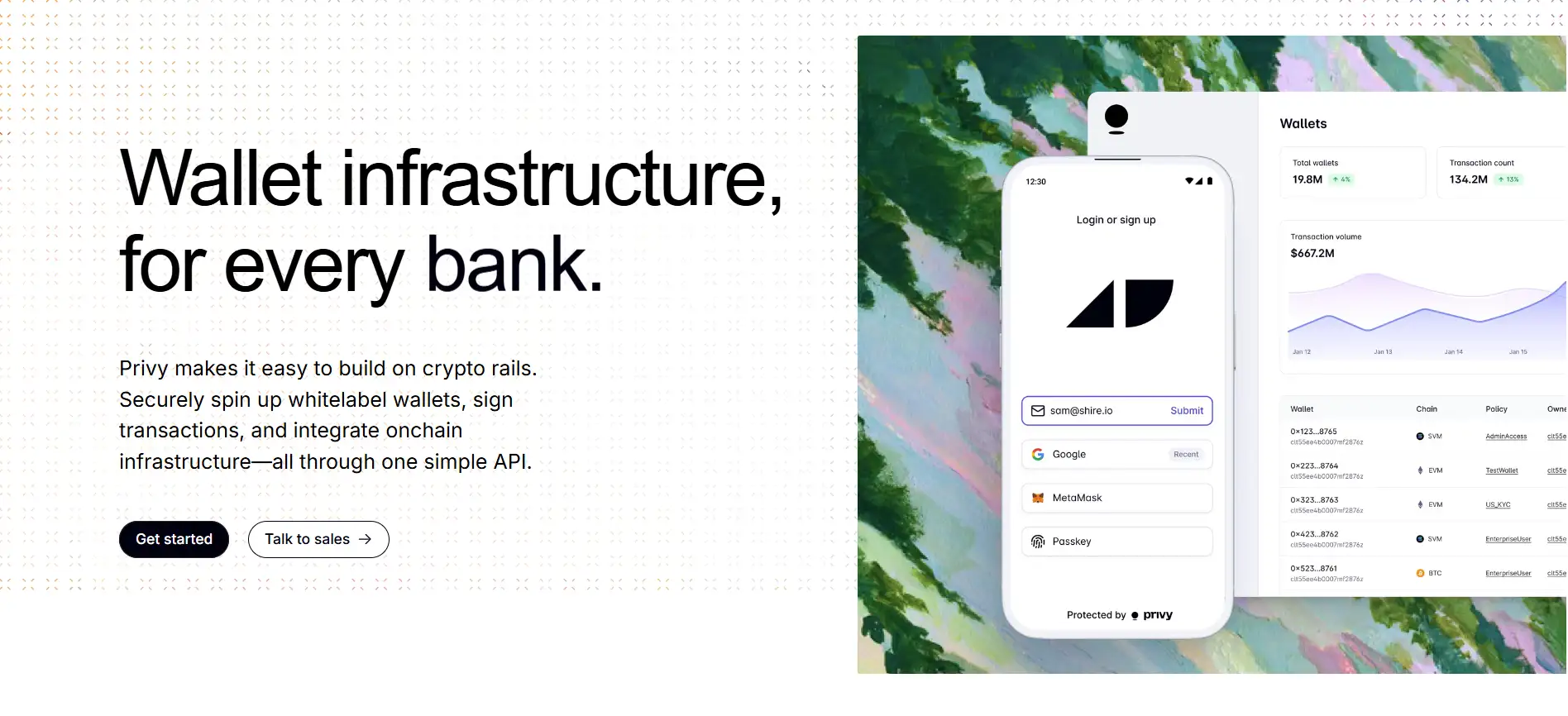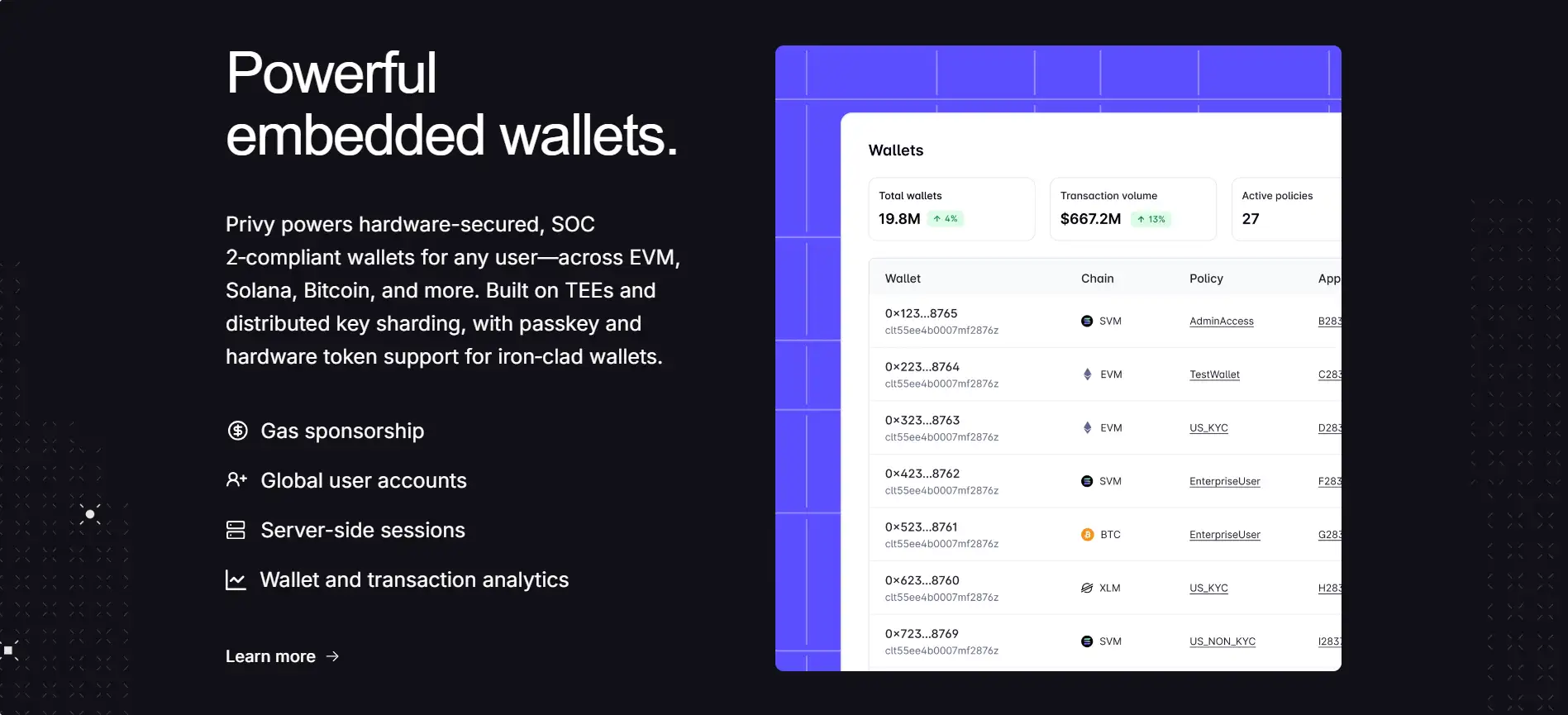About Privy
Privy is a cutting-edge wallet infrastructure platform that empowers developers to build secure, scalable, and seamless crypto-native experiences. Designed for modern applications, Privy provides everything from embedded wallet provisioning to secure key management across chains like EVM, Solana, and Bitcoin. Whether you're building a crypto app, fintech platform, AI agent, or game, Privy equips you with the infrastructure to launch and scale confidently.
With a mission to abstract away the complexities of Web3 while preserving its core values, Privy enables developers to create intuitive user experiences without sacrificing security or control. From gas sponsorships to delegated server sessions and passkey authentication, Privy makes onchain infrastructure accessible for any use case, helping developers onboard any user in seconds—crypto-native or not.
Privy offers a complete infrastructure stack for developers seeking to build seamless, secure, and scalable Web3 applications. The platform specializes in embedded wallet solutions that make onchain interactions intuitive for users without sacrificing decentralization or performance. From high-frequency trading apps like Hyperliquid to consumer experiences like Zora, Privy has become the go-to solution for some of the most prominent players in the crypto space.
What makes Privy stand out is its commitment to abstracting complex cryptographic processes while giving developers full control over user identity, authentication, and key management. Its enterprise-grade security relies on hardware-isolated trusted execution environments (TEEs) and distributed key sharding—ensuring that no single entity, not even Privy itself, can compromise user assets. These protections are backed by audits from industry leaders like Cure53, Zellic, SwordBytes, Doyensec, and a public bug bounty on HackerOne.
The Privy API stack supports gasless transactions, smart wallet integration, delegated onchain actions, multi-factor authentication, and much more. Users can sign up using email, SMS, Google, Apple, passkeys, or external wallets like MetaMask—all within a few seconds. This makes Privy ideal for apps that need to onboard users quickly while still offering the flexibility of full wallet interoperability.
For developers building fintech products, Privy offers tools to create stablecoin accounts, enforce compliance policies, and handle complex user flows like account linking and OAuth scopes. For crypto-native projects, it enables seamless token swaps, bridging, and yield access. In gaming, it powers in-game wallets and cross-game assets at scale without any compromise on performance or UX.
Some notable use cases include:
- Blackbird – powers restaurant loyalty programs with embedded wallets for onchain rewards.
- Vector – enables social crypto trading by provisioning wallets during user sign-up.
- Nook – brings high-yield savings to users through stablecoins, abstracting away DeFi complexity.
- Crypto: The Game – lets users play and trade NFTs without knowing anything about crypto.
- Farcaster – enables seamless onchain social interactions with zero crypto friction.
Competitors in this space include Sequence, Web3Auth, and Magic. However, Privy's modularity, deep security posture, and wide protocol support set it apart from the rest—especially for enterprise-grade and high-performance environments.
Privy provides numerous benefits and features that make it a leader in embedded wallet infrastructure:
- Embedded Wallets: Provision secure, self-custodial wallets for every user instantly—no seed phrases or wallet extensions required.
- Multi-Chain Support: Fully compatible with EVM, Solana, Bitcoin, and more, making cross-chain experiences seamless.
- Enterprise-Grade Security: Leveraging TEEs, key sharding, and end-to-end encryption, Privy ensures wallets are secure and private.
- Gas Sponsorship: Enable gasless transactions to remove friction from user onboarding and transaction flow.
- Delegated Server Sessions: Automate onchain actions securely from your backend with full policy control.
- Progressive Onboarding: Allow users to sign up via email, SMS, social login, or passkeys—and link external wallets later.
- Custom UI Components: Use whitelabeled, modular components to match your brand while optimizing conversion rates.
- Integrated Tools: Built-in support for swaps, bridges, and fiat on-ramps for full-stack product integration.
- Developer Friendly: A simple and powerful API stack lets you get started in minutes and go live within hours.
- Proven at Scale: With 95M+ accounts and $billions in volume processed monthly, Privy is trusted by leading crypto and fintech apps.
Privy makes it simple for developers to integrate secure, self-custodial wallets into any app, fast:
- Step 1 – Visit the Developer Portal: Go to the Privy website and access the documentation to explore APIs and SDKs.
- Step 2 – Get API Access: Sign up for an account and obtain your API key to begin building in a test or production environment.
- Step 3 – Configure Onboarding: Set up user login via email, SMS, or OAuth providers like Google, Apple, or social media.
- Step 4 – Embed Wallets: Use Privy’s modular UI or backend APIs to provision secure embedded wallets at sign-up, with support for multi-wallet accounts.
- Step 5 – Customize Policies: Define access controls, delegation settings, and transaction rules using programmable policy engines.
- Step 6 – Integrate Tools: Add gas sponsorship, swap integrations, and analytics to deliver a complete user experience.
- Step 7 – Launch: Once configured, deploy your app to production. Most teams go live with Privy in hours—not weeks.
- Need help? Reach out to the team or explore the full Privy Docs to find in-depth tutorials and best practices.
Privy FAQ
Yes, Privy supports account pregeneration, allowing developers to create wallets and user objects before actual registration. This is especially useful for invite-only launches, airdrop campaigns, or custom onboarding flows. Wallets can be pre-configured, linked to metadata, and activated later when the user logs in—enabling seamless transitions from guest to registered user.
Privy uses hardware-isolated Trusted Execution Environments (TEEs) combined with key sharding to enforce end-to-end encryption of private keys. Keys are never reconstructed in software and never touch Privy’s core systems. All signing occurs inside secure hardware, meaning even Privy employees cannot access or extract the keys. This architecture is backed by audits from Cure53, Zellic, and others.
Privy prioritizes self-custody and user control, which means recovery methods are solely managed by the user. If a recovery method such as a passkey, authenticator, or backup fails—and no alternative login method was added—then access to the wallet may be permanently lost. Privy strongly recommends linking multiple login methods and backing up to cloud storage like Google Drive or iCloud during onboarding to prevent irreversible loss.
Yes, Privy supports server-side delegated sessions and automated wallet orchestration, making it an ideal solution for AI agents and backend systems that need to interact with blockchain autonomously. Developers can use simple APIs to spin up wallets, assign policies, and automate transaction signing—without involving user-side interfaces or requiring manual input, perfect for AI-driven use cases.
Absolutely. Privy is designed to abstract away crypto UX while retaining all the benefits of onchain functionality. Users can onboard with familiar logins like email or Google, while Privy handles wallet creation and signing behind the scenes. Features like gas sponsorship, passkey authentication, and smart wallet support ensure a smooth experience, even for users who don't know they're interacting with the blockchain.
You Might Also Like












